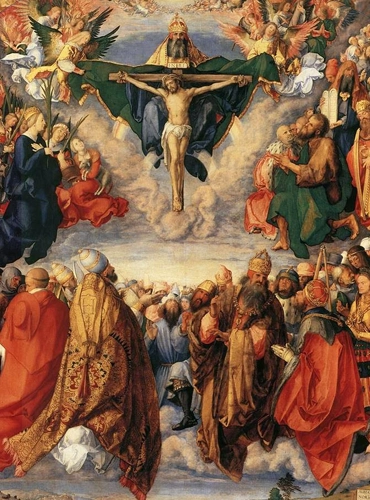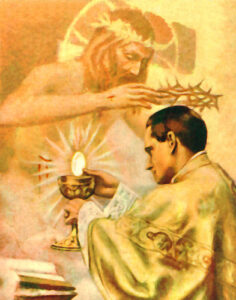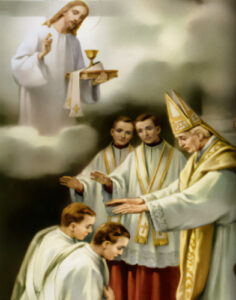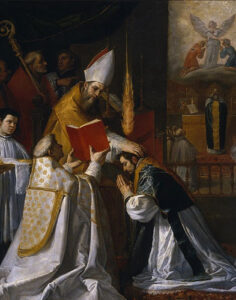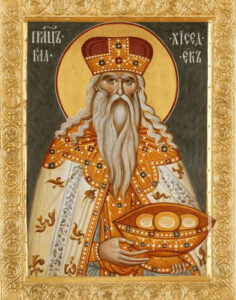Solemnity of All Saints
November 1st, 2023 – Rev 7:2-4, 9-14, Ps 24:1BC-2, 3-4AB, 5-6, 1 Jn 3:1-3, Mt 5:1-12A
Brothers and sisters, today we’re blessed with the opportunity to celebrate the Solemnity of All Saints. The solemnity itself dates back at least to the 700’s, since it was on November 1st during the reign of Pope Gregory III that an oratory was established in Saint Peter’s Basilica, filled with relics “of the holy apostles and of all saints, martyrs, and confessors, [and] of all the just made perfect who are at rest throughout the world.”
We all probably have our favorite saints, and like to think of them and pray for their intercession. These are good things, but, when it comes to all the saints, Saint Bernard of Clairvaux, in an old homily, asks about the point of this celebration. He asks: “Why should our . . . celebration of this feast day mean anything to the saints? What do they care about earthly honors when their heavenly Father honors them? . . . The saints have no need of honor from us; neither does our devotion add the slightest thing to what is theirs. Clearly, if we venerate their memory, it serves us, not them.” Saint Bernard isn’t diminishing the importance of the saints, but he’s raising a good question. It’s great that there’s saints, but, when we think of them and pray to them, it doesn’t make them feel good. They’re already in heaven, and are perfectly happy. When we do these things, what we’re really doing is helping ourselves get to heaven, and this is because the saints are an excellent model for us.
So, let’s consider how the saints can help us to become like them and can help us get to heaven. We can consider three points: first, how being a saint or being holy means becoming more fully who we are, secondly, that no matter what problem or failing we might have, the saints can give us an example of faithfulness, and, thirdly, that the saints teach us how to live joy-filled lives. So, again, first, we have holiness making us more fully ourselves, secondly, we have their example in times of trial, and thirdly, we have the joy of the saints.
First, in the lives of the saints we see that holiness doesn’t destroy their personalities; on the contrary, saints are more fully themselves. Sinfulness tends to bulldoze our personalities, and sins tend to make people all the same, leveling out the differences; it reduces men and women to that thing which they desire. We can think of, for example, greedy people we know: aren’t they all sort of the same? Is there really that much difference between them? We could say that “sin drains the color out of men and women, and replaces it with the color of sin which is a common property. All sinners look less like themselves and more like one another.” Saints, however, “are intensely themselves.” God created us all as individuals, and all of us are something special. Since holiness means growing close to God, the holier we are, the closer we are to the God who created us, and the closer we become to that perfect individual that He created us to be.
It’s important to keep in mind, though, that saints are made, not born. They have their struggles. For example, Saint Louis Orione, an Italian priest, was known for his vicious temper. When his congregation was just starting, his brothers would pray whenever he went to meet with a bishop, since they worried that he would get angry, start shouting, and cause problems for them all. Yet, with time and grace, Orione was able to overcome his temper.
This leads us into our second point: do you have a particular problem? Do you live with a difficult situation? There’s a saint for that, not just in the sense that there’s probably a patron saint of that difficulty, but rather in the sense that there’s probably some saint who suffered through that difficulty and overcame it with God’s grace. For example, in Venerable Matthew Talbot, an unskilled Irish laborer, we have an example of someone who struggled with alcoholism. Saint Benedict Joseph Labre was homeless, Saint Bernadette and Saint Faustina had great difficulties in school, and a great number of saints suffered from health problems. Yet, through it all, God gave them the grace to come through. And the great secret to holiness is this: God wants us to become saints too. He wants us to get to heaven with Him, and so He will give us everything we need. All we need to do is put in our effort, to try to be the best husband or wife, or student, or child, that we can, and He will give us the graces we need.
Thirdly, the saints are an example of overwhelming joy. G. K. Chesterton wrote that “Joy, which was the small publicity of the pagan, is the gigantic secret of the Christian.” In his Apostolic Exhortation, The Joy of the Gospel, Pope Francis wrote that “Joy . . . always endures [because it is] born of our personal certainty that, when everything is said and done, we are infinitely loved.” We are infinitely loved by a God who, as the Easter Exultet proclaims, “to ransom a slave . . . gave away His Son!” The saints bear witness to this perennial truth. In the midst of great sufferings from tuberculosis, Saint Gabriel Possenti would write to his father “My life is one of unending joy.” Joy is also their apostolic witness: “Joy is a net of love by which we catch souls” remarked Saint Teresa of Calcutta, who was no stranger to sorrow. This is all because “saints know nothing of the only crushing sorrow in the world – the sense of unforgiving sin – because if they sin, the run with childlike trust to ask their Father’s forgiveness. Utterly-trustful and childlike love of God is the one true joy in the world, and so saints are the happiest people imaginable” (Sr. Mary Eleanore, The Joyful Ways of the Saints, 11).
Brothers and sisters, today’s Gospel gives us the path to heaven: following the Beatitudes and our Lord Jesus Christ. Leon Bloy, a French Catholic writer, once said “the only tragedy in life is not to become a saint.” “The only tragedy in life is not to become a saint.” Tradition holds that once Saint Thomas Aquinas’s sister asked him how she could become a saint. He simply answered: “Will it.” We must really want to become saints and to get to heaven. We can ask ourselves: are we really trying to become saints? Are we really striving to live like they did? A question that changed Saint Madeline Sophie Barat’s life was when her brother, a priest, asked her: “Can you be satisfied with mediocrity, when heroism is within your grasp?” Can we be satisfied with mediocrity, when heroism is within our grasp? Let’s ask, through the intercession of Mary, Queen of All Saints, and all the angels and saints in heaven, for the grace to live holy lives, so that we can live eternally with God in heaven.

